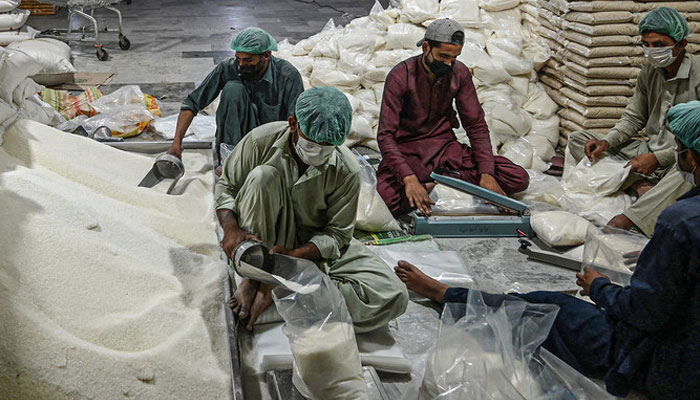Cabinet spells out 0.5m-tonne sugar export procedure
Exporters must ensure that consignments are shipped within 90 days of receiving quota
ISLAMABAD: Pakistan’s federal cabinet has greenlit the export of 0.5 million tonnes of sugar, with quotas to be distributed among four provinces based on their production shares. This decision ratifies the Economic Coordination Committee’s (ECC) earlier approval, allowing the additional sugar export
As per the Cabinet decision, the export quota will be distributed among the provinces based on their sugar production, with over 64 percent allocated to Punjab, 6 percent to Sindh, and 30 percent to Khyber Pakhtunkhwa.
At its meeting on October 11, the ECC decided to permit the Pakistan Sugar Mills Association (PSMA) to export 500,000 metric tons (MT) of sugar in addition to the previously permitted export of 200,000 MTs of the commodity, under certain terms and conditions.
The PSMA was directed to provide an undertaking that sugar mills will start production by November 21 for the next crop year, and the export permission for mills not complying with this condition will be revoked. The PSMA has given an undertaking that the ex-mill price of sugar will not exceed Rs140 per kilogram.
The sugar mills are also required to ensure that export proceeds are received in advance through banking channels for exports to Afghanistan, while exports to other destinations may be made by opening letters of credit (LCs). All exporters must ensure that export consignments are shipped within 90 days of receiving the quota from the respective cane commissioners.
The federal cabinet has also appointed the deputy prime minister as the chairman of the Sugar Monitoring Committee, replacing the minister for petroleum. Permission for the export of sugar may be revoked in the interest of maintaining stability in the domestic market and controlling retail prices, as well as for other violations of the terms and conditions.
-
 Jennifer Garner Reveals Why She Doesn't Like Botox And What She Gets Instead
Jennifer Garner Reveals Why She Doesn't Like Botox And What She Gets Instead -
 Instagram To Alert Parents When Teens Search Suicide Or Self-harm Terms
Instagram To Alert Parents When Teens Search Suicide Or Self-harm Terms -
 Meghan Markle Feels Kicked In The Teeth With Netflix’s Decision To Close A Door: ‘She Needs Her Family’
Meghan Markle Feels Kicked In The Teeth With Netflix’s Decision To Close A Door: ‘She Needs Her Family’ -
 World Economic Forum CEO Borge Brende Steps Down Following Jeffrey Epstein Ties Controversy
World Economic Forum CEO Borge Brende Steps Down Following Jeffrey Epstein Ties Controversy -
 Prince Harry's Ex Chelsy Davy Makes Special Announcement
Prince Harry's Ex Chelsy Davy Makes Special Announcement -
 Dominic Evans Speaks Out After Being Accused Of Being Involved In Nancy Guthrie Kidnapping
Dominic Evans Speaks Out After Being Accused Of Being Involved In Nancy Guthrie Kidnapping -
 AI Doomsday By 2028? New Study Warns Of Global Social, Economic Disruption & ‘ Intelligence Crisis’
AI Doomsday By 2028? New Study Warns Of Global Social, Economic Disruption & ‘ Intelligence Crisis’ -
 Do Sophie And Benedict Bridgerton Get Married As Netflix Show Returns For Season 4 Part 2?
Do Sophie And Benedict Bridgerton Get Married As Netflix Show Returns For Season 4 Part 2? -
 Prince William Reveals He's 'a Little Biased' Toward One Hollywood Star
Prince William Reveals He's 'a Little Biased' Toward One Hollywood Star -
 Meghan Markle, Prince Harry Visit Special Charity On Final Day Of Jordan Trip
Meghan Markle, Prince Harry Visit Special Charity On Final Day Of Jordan Trip -
 Natalie Dormer's Reaction To Sarah Ferguson's Epstein Links Resurfaces After 'The Lady' Release
Natalie Dormer's Reaction To Sarah Ferguson's Epstein Links Resurfaces After 'The Lady' Release -
 Did You Know Famous Windows 10 Background Was Shot In Real Life? Here's Story
Did You Know Famous Windows 10 Background Was Shot In Real Life? Here's Story -
 Pete Davidson's Baby Mommy Elsie Hewitt Reveals Why She 'hated' Being Pregnant
Pete Davidson's Baby Mommy Elsie Hewitt Reveals Why She 'hated' Being Pregnant -
 Harry, Meghan Show Royal Family How To Make Impact Without Public Money
Harry, Meghan Show Royal Family How To Make Impact Without Public Money -
 Hillary Clinton Set For Deposition Before House Committee Today In Jeffrey Epstein Investigation Case
Hillary Clinton Set For Deposition Before House Committee Today In Jeffrey Epstein Investigation Case -
 Samsung Galaxy S26 Ultra Debutes With Display That Blocks Side Viewers
Samsung Galaxy S26 Ultra Debutes With Display That Blocks Side Viewers




